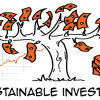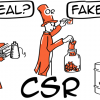Script
Backcasting: Script
You probably know this famous quote by Albert Einstein “we cannot solve our problems with the thinking we used when we created them”. What does this mean for solving our sustainability problems?
Why is it so hard to plan strategically toward sustainability together as a society?
Research shows that in large groups of people, the most common planning methodology is forecasting: using trends from the past, projecting them and fixing problems to improve the future. This is okay when we are on the right trajectory. But it’s like driving using only your review mirror hoping that the road ahead is going to be the exact logical continuation of the last few kilometers. It sounds dangerous and yet this is what we are doing. And it may also mean that we’re not asking an important question: what if we need to change direction? What if we want, or need a very different future from where we’re heading? Here is an example of what forecasting applied to decision-making looks like in our society today: we are 7 billion people on Earth today, trends suggest that we will be around 9 billion in 2050, everybody needs to drive to work and travel for business and holiday, therefore, we need to build many more cars, roads, planes, airports, etc. Doesn’t seem to leave a lot of room for creativity or something different, right?!
Don’t get me wrong! Forecasting is not always bad. It is actually a very good way to build upon successes, to understand problems, adapt and become more resilient. The funnel metaphor used in a previous video is a great example of useful forecasting. But it is not enough to plan in a very complex system like our world when the actual trends are part of the problem. By definition, forecasting will reproduce in the future problems that we already have today. In this article “Why Sustainability Is Now the Key Driver of Innovation” the Harvard Business Review suggests: “Don’t start from the present. If the starting point is the current approach to business, the view of the future is likely to be an optimistic extrapolation. It’s better to start from the future”. As Einstein suggested in his quote, we need a different way of thinking. We need backcasting from success: planning from the future.
Individually we all use backcasting all the time. Think about the last time you planned your holiday. Did you only look at trends of where everybody else was going? Of course not! What if the trendiest destinations were white sand beaches in the Pacific and you like hiking in the mountains? You probably had a vision of what success looked like for your holiday and you planned step by step toward it in order to find the best destination given your own constraints (budget, dates, hiking skills, etc.).
The game of chess is a complex system where players use backcasting. Both players share a very clear vision of success in principles: checkmate. They do not know in detail what the board is going to look like at the end of the game. But, they DO know that one of the two kings will not be able to escape from capture. Knowing this, they make all their decisions in order to achieve checkmate, adjusting their strategy turn after turn depending on the new look of the board.
To plan successfully and strategically toward a truly sustainable future, we need to use backcasting from sustainability principles. This can help us agree, even in large groups, on what the principles of success are – for sustainability. We don’t need to waste time and resources on short-term ‘ad-hoc’ decisions that do not get us closer to sustainability checkmate. We don’t need to argue on the details of what a sustainable society (the chess board) looks like in the end. We don’t need to reproduce in the future problems that we have today. Instead, we can adjust our strategy, step-by-step, as new technologies and inventions appear, in order to achieve success.
So if we agree that backasting from sustainability principles sounds like a good way forward, what is checkmate for sustainability? What are the sustainability principles that we need to backcast from?






